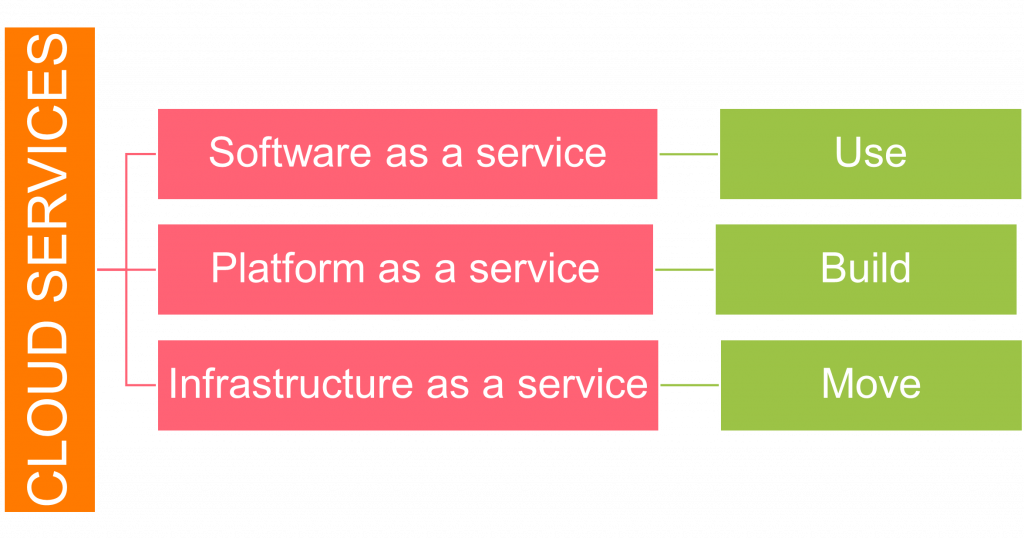The Impact of Cloud Computing Technology in Saudi Arabia
What is Cloud Computing?
Cloud computing allows you to rent rather than buy Information Technology infrastructure. Businesses which “move to the cloud” are essentially moving their IT processes offsite. Cloud solutions enable companies to focus on their strategic tasks and avoid the burden of hiring and managing full-fledged IT systems. Shifting to the cloud can involve moving numerous processes and applications on various devices (refer to the image below).
There are broadly three types of clouds– Public, Private, and Hybrid, each providing a different level of security and requiring different extents of involvement by customer companies.
Public Cloud:
The complete computing infrastructure is located in the cloud provider’s premises, and services are provided over the internet. Multiple companies share the provider’s IT systems.
Private Cloud:
As indicated by the name, private clouds are exclusive to one particular customer. The infrastructure could be located in the customer’s premises or with the provider. These clouds offer the highest level of security.
Hybrid Cloud:
An amalgamation of public and private clouds. Customers usually host crucial IT applications on their premises and non-critical processes at the provider’s location.
Cloud Computing providers offer three kinds of services – Software as a service (SAAS), Platform as a service (PAAS), and Infrastructure as a service (IAAS). SAAS is simply hosting software and providing it to the end-user, like Dropbox. PAAS offers companies a platform to build solutions with the help of advanced tools, like Microsoft Azure which can be used to create mobile applications. IAAS provides visualised computing resources over the internet and access to virtual machines, like the Google Compute Engine, which allows users to perform high memory computations. The image below is a one-word summary for each cloud service.

This outsourcing of IT functions has led to a regime shift in the IT universe. Microsoft, Google, Facebook, and Amazon may have consolidated the cloud computing space, but there are numerous firms springing up with a focus on perfecting every step of providing cloud solutions. Saudi Arabia, the largest country in the Middle East, is an upcoming hub of cloud computing services.
Cloud Computing Technology in Saudi Arabia
The World Cloud Show is the quintessential cloud event, and its 2021 series took place in Jeddah, a port city in the Kingdom of Saudi Arabia (KSA). The Oracle sponsored event made it clear that KSA is revamping their tech strategy in response to the Covid-19 situation. The country head for Oracle highlighted that state-owned organisations, shopping mall giant Arabian Centres Company, and leading medical research institutes have already shifted to the Oracle Cloud. Disaster recovery solutions was an area that the oil-rich country home to 16% of the world’s total oil reserves hopes to make advancements in by integrating cloud computing into the public sector enterprises.
A cloud region is simply the actual real-life geographic location where public cloud resources are located. Oracle launched its first cloud region in Jeddah in 2020 and is on track to establish a second cloud region in Saudi Arabia. This is the first public cloud vendor with a ‘region’ in Saudi Arabia. Numerous organisations have leveraged the power of Oracle Cloud to achieve strategic objectives.
King Abdullah International Medical Research Center (KAIMRC), the leading biomedical and clinical research institution in Saudi Arabia, has subscribed to the Oracle Cloud Infrastructure. They aim to use the Texas-based company’s cloud to provide high-performance computing (HPC) abilities in order to aid the complex research into a potential treatment for COVID-19 and other infectious diseases.
The kingdom’s Ministry of Health (MoH) created a chatbot to respond to all Covid 19 queries and enhance the medical experience offered to citizens. The Chatbot was hosted on the Oracle Cloud Infrastructure, providing an automated chat service on the MoH website and social media channels. The monthly usage for the MoH bot is more than a million hits a month which has meant more cash inflow for Oracle.
Cloud has made its way into the transportation sector as well! Saudi Railway Company has initiated a major digital transformation with the Oracle Cloud Infrastructure to enhance business agility, create a robust cybersecurity infrastructure, automate core ticketing system and reduce costs. Oracle is enjoying the lion’s share in the Saudi cloud market.
The adoption of cloud computing was not merely a response to the pandemic. It started about a decade ago and has consistently been growing. A report published by “Dun & Bradstreet”, presented at a forum “Reshaping Information Technology Future Features” held in KSA a couple of years ago, revealed that the average spending on IT in transformative industries has risen by 7.5% year on year from 2013-2018. It was further reported that 44% of public organisations have already applied or are in the process of integrating cloud computing into their operations.
Cloud Computing Conducive Regulatory Framework in Saudi Arabia
In February 2019, the Communication and Information Technology Commission (CITC), the telecom regulator in KSA, published a document entitled ‘KSA Cloud First Policy’, showing that adoption of cloud services at the government level is on the kingdom’s radar. The stated goal was to accelerate the adoption of cloud computing services by mandating that government and semi-governmental entities consider cloud options when making new information technology investment decisions.
More recently, on April 12th 2021, CITC issued an updated version 3 of the Cloud Computing Regulatory framework. These updates were driven by the Covid-19 pandemic, which increased the urgency of rolling out high-performance cloud services to match the rising demand in Saudi Arabia.
The major changes were the following – definition updates and clear description of the kind of services that are categorised under “cloud service”, cloud service provider registration levels, complete revamp of the customer classification with regard to the service being accessed, and clarification of restrictions specific to the flow of government, public, and private data outside the sovereign territory of KSA. This update was received positively by service providers as the new regulations would expand the customer base of providers, enable more diverse services to be offered while simultaneously ensuring stronger data privacy protection. It is interesting to note
that these regulations were drafted with active participation from cloud providers and companies relying heavily on cloud services. From a regulation point of view, the market for cloud services is well supported by policymakers and KSA.
Silicon Valley Collaborations
Saudi Arabia has been negotiating with Silicon Valley and actively seeking international investment to adequately fund its Vision 2030 reform plans. The primary motivation for these expansions is to diversify away from the existing oil-dependent economy. KSA is already investing substantially in American technology firms through its Public Investment Fund. Saudi Telecom Company (STC) has committed to the Vision 2030 by adhering to the Cloud First Policy.
There couldn’t be a more strategic corporation to lead the diversification projects than Aramco, the largest oil producer in the world with a market capitalisation of approximately $1.89 trillion!
The company that generated a revenue of $850 billion during the normal year of 2019 has joined forces with Google. The Silicon Valley giant synonymous with the internet will open a “cloud region” through which it can offer its cloud services in the Middle Eastern kingdom via a joint venture with Aramco.
Aramco’s senior vice president of technical services proclaimed that the ability to leverage cloud services is instrumental in Saudi Arabia’s business transformation. With this corporate thinking of the partly state-owned entity, it goes without saying that KSA is putting its money where its mouth is.
Aramco released this statement after the Google tie-up – “The collaboration taps into rapidly expanding cloud services demand in Saudi Arabia, which is forecast to reach a market opportunity up to $10 billion by 2030”. Google promises to deliver high performance and low latency cloud services to customers in the kingdom.
It was due to an external event that Google had to delay their plan to establish and operate a cloud region in the kingdom until 2020. Google said its investment into Saudi Arabia would allow businesses to grow and scale their offerings in the kingdom. The deal would also inflate its own cloud computing business, which brings in more than $10 billion in annual revenue for its parent, Alphabet Inc.
Regional e-commerce firm Noon and social media platform Snap are the primary customers of the Aramco-Google cloud services. Hisham Zarka, CTO and managing director at Noon, was ambitious about the new cloud region in the kingdom. Mr Zarka assured more secure delivery of Noon’s services at higher speeds with state of the art infrastructure.
It remains to be seen if more Silicon Valley firms land in the deserts of Saudi Arabia. Going by the investments that Microsoft and Facebook have made in establishing cloud regions in the UAE and Amazon in Bahrain, it is wise for the kingdom to focus on extracting maximum benefits from the collaboration with Oracle and Google.
Possible Roadblocks
Sanctions and reputational backlash against the regime are always lingering problems for KSA. Google began talks with the kingdom on the Google Cloud project in 2018, but talks stalled following the murder of journalist Jamal Khashoggi by state agents in the same year. This incident led to widespread shunning from the international community.
The White House is currently occupied by a less pro-Saudi government led by the democrats. President Joe Biden has made it clear that the relationship with KSA won’t be as cordial as it was under Trump, following the humanitarian crisis in Yemen and Khashoggi’s murder in an embassy. This poses a threat to KSA’s economic transformation plan, aka Vision 2030, of which cloud computing is a crucial pillar, as the inflow of western funding may be affected.
Competition is fierce among nations in the middle east. The United Arab Emirates, Bahrain, Qatar, Jordan, and Egypt are also courting cloud service behemoths to establish cloud regions and joint ventures in their respective countries. The entry of cloud providers of the likes of Amazon Web Services, Microsoft, IBM, Alibaba, and SAP would mean a rise in employment rate, business performances, and a forward push to the economy. As a result, every country is tuning their IT policy framework to suit the likes of cloud providers. Governments are vying for long term collaborations with large corporations for their own reasons. A better deal from another Middle Eastern country would woo providers away from KSA, and this is a potential threat to Saudi’s vision. The below image shows the biggest cloud players in the middle east.

Internet is essential for cloud services to be provided, and for a seamless service, fast internet connections are required. Although 5G services have been rolled out recently, there is a lot of room for improvement of broadband speed in the kingdom. Advancements in internet speed and the development of more robust internet infrastructure must happen in parallel with the growth of cloud computing. Falling short of required internet speeds would render the developments in cloud computing useless.
Future Outlook
Detailed market analysis and segment forecast from 2021-2027 have been covered by KYM Global in the Syndicate Report titled Saudi Arabia Cloud Computing Market. The SAAS model is most prominent currently owing to its low maintenance, cost flexibility, and ease of deployment. The IAAS model is forecasted to grow at a higher CAGR over the next decade. This predicted high growth rate for the IAAS segment is due to the fact that regional market players are aggressively targeting the infrastructure service model in the country. The private cloud deployment model held the major share of the Saudi Arabia cloud computing market. Improved data control and lower security risks are the key drivers of the larger segment adoption of private clouds. The hybrid cloud model is expected to grow at the highest CAGR as it offers the security of private clouds and flexibility of public clouds.
The influx of resources and proprietary technology from Silicon Valley combined with capital backing from KSA creates a promising environment for the boom of cloud computing in the Arabian kingdom. Reaching the forecasted market size seems likely given the current pace of growth.

Nandini is a highly accomplished healthcare industry professional with an impressive track record of success. With 15 years of experience working for major healthcare companies, she brings a wealth of knowledge and expertise to our firm. As our Research Head at KYM Global Insights, Nandini oversees all of our research and consulting services, working closely team of experts to deliver insights that shape the future of healthcare. Whether conducting in-depth market analysis, developing custom research methodologies, or providing strategic guidance to our clients, she is dedicated to delivering the highest quality services that help clients achieve their goals.
